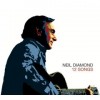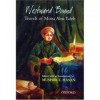Title: The In-Between World of Vikram Lall
From a quiet retreat near the shores of Lake Ontario, Vikram (Vic) Lall, “numbered one of Africa’s most corrupt men, a cheat of monstrous and reptilian cunning”, tries to explain his life (“if more of us told our stories to each other, we would be a far happier people”) without defending his actions. He begins with the summer of 1953, when he was eight years old and living in British-ruled Kenya. His playmates, apart from his little sister, were an African friend, Njoroge, and two British children; in a sense, Vikram was an “in-between” from very early in his life.
As the years pass, Vic goes from working as a Ministry of Transport employee to becoming a crucial cog in embezzlement schemes in high places, almost without realising it: “Total corruption occurs in inches and proceeds through veils of ambiguity.” He is influenced in invisible, unknowable ways by external forces and in turn, his actions affect his country’s history. This is a beautifully written, very elegant novel about the gradual decay of a man who always feels himself to be on the periphery of things, on the outside looking in. And Vassanji’s writing never strikes the wrong note; throughout, you feel like you’re inside Vikram’s head.






